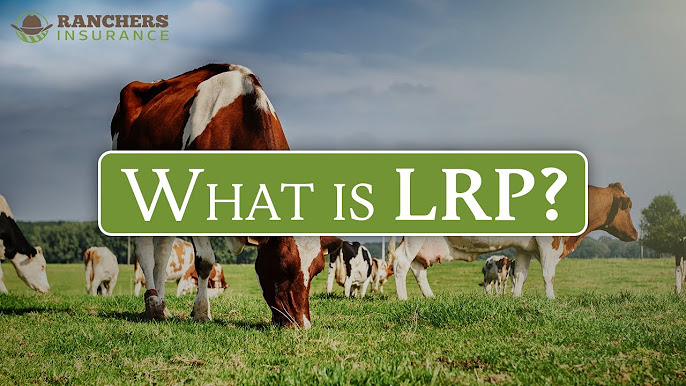Comprehending Livestock Danger Security (LRP) Insurance: A Comprehensive Overview
Browsing the world of animals danger defense (LRP) insurance coverage can be a complicated endeavor for numerous in the farming sector. From exactly how LRP insurance coverage works to the various coverage options offered, there is much to uncover in this extensive overview that could possibly shape the means livestock producers approach danger administration in their companies.

Just How LRP Insurance Coverage Functions
Sometimes, comprehending the technicians of Animals Danger Security (LRP) insurance coverage can be complex, yet breaking down just how it works can give clearness for farmers and ranchers. LRP insurance coverage is a risk monitoring tool developed to shield animals producers versus unanticipated rate declines. It's essential to note that LRP insurance policy is not an earnings assurance; rather, it concentrates solely on price threat defense.
Eligibility and Protection Options

When it pertains to coverage alternatives, LRP insurance uses manufacturers the versatility to select the coverage level, insurance coverage period, and recommendations that finest fit their danger administration requirements. Protection degrees commonly vary from 70% to 100% of the anticipated finishing worth of the insured animals. Producers can additionally select insurance coverage periods that align with their production cycle, whether they are insuring feeder cattle, fed cattle, swine, or lamb. Endorsements such as cost danger defense can further personalize insurance coverage to shield against negative market variations. By comprehending the eligibility requirements and insurance coverage options available, animals manufacturers can make educated choices to handle threat successfully.
Pros and Cons of LRP Insurance Policy
When evaluating Animals Danger Protection (LRP) insurance coverage, it is important for livestock manufacturers to consider the downsides and benefits inherent in this danger management device.

One of the main advantages of LRP insurance is its capability to give security against a decrease in livestock costs. This can help secure manufacturers from economic losses arising from market variations. Additionally, LRP insurance provides a level of adaptability, allowing manufacturers to customize coverage levels and plan durations to suit their particular requirements. By securing an assured rate for their animals, producers can much better take care of danger and prepare for the future.
Nevertheless, there are additionally some downsides to consider. One limitation of LRP insurance is that it does not safeguard against all types visit the site of threats, such as disease episodes or all-natural calamities. In addition, premiums can sometimes be costly, specifically for producers with big livestock herds. It is crucial for producers to very carefully analyze their specific risk exposure and financial circumstance to establish if LRP insurance is the best risk administration device for their procedure.
Understanding LRP Insurance Premiums

Tips for Making Best Use Of LRP Benefits
Taking full advantage of the benefits of Livestock Risk Defense (LRP) insurance coverage requires calculated planning and aggressive risk management - Bagley Risk Management. To maximize your LRP insurance coverage, consider the complying with ideas:
On A Regular Basis Examine Market Problems: Stay informed about market fads and price changes in the livestock sector. By keeping an eye on these elements, you can make informed choices regarding when to acquire LRP insurance coverage to shield versus potential losses.
Establish Realistic Protection Degrees: When picking insurance coverage degrees, consider your production expenses, market worth of animals, and prospective dangers - Bagley Risk Management. Setting realistic insurance coverage degrees makes sure that you are properly shielded without paying too much for unnecessary insurance coverage
Expand Your Coverage: Rather than depending exclusively on LRP insurance, think about diversifying your threat monitoring techniques. Combining LRP with various other threat monitoring devices such as futures agreements or choices can give comprehensive protection versus market unpredictabilities.
Review and Readjust Insurance Coverage Regularly: As market conditions transform, regularly examine your LRP insurance coverage click here to find out more to ensure it aligns with your present risk direct exposure. Readjusting insurance coverage levels and timing of acquisitions can help maximize your danger protection method. By following these ideas, you can maximize the benefits of LRP insurance coverage and guard your livestock procedure against unforeseen threats.
Conclusion
Finally, livestock danger defense (LRP) insurance is a useful device for farmers to manage the economic threats click reference associated with their livestock operations. By comprehending exactly how LRP functions, qualification and coverage options, in addition to the benefits and drawbacks of this insurance policy, farmers can make educated decisions to secure their incomes. By very carefully considering LRP costs and applying techniques to optimize benefits, farmers can alleviate potential losses and make certain the sustainability of their procedures.
Livestock producers interested in getting Livestock Threat Protection (LRP) insurance coverage can check out a variety of eligibility standards and protection options tailored to their particular animals operations.When it comes to protection alternatives, LRP insurance policy supplies producers the flexibility to pick the protection level, protection period, and recommendations that best suit their threat management demands.To realize the complexities of Animals Risk Security (LRP) insurance fully, comprehending the factors affecting LRP insurance premiums is vital. LRP insurance costs are identified by numerous elements, including the insurance coverage level selected, the expected cost of animals at the end of the coverage duration, the kind of livestock being insured, and the size of the coverage period.Review and Adjust Protection Regularly: As market problems transform, regularly examine your LRP protection to guarantee it lines up with your existing threat exposure.
Comments on “Navigating Business Risks with Bagley Risk Management”